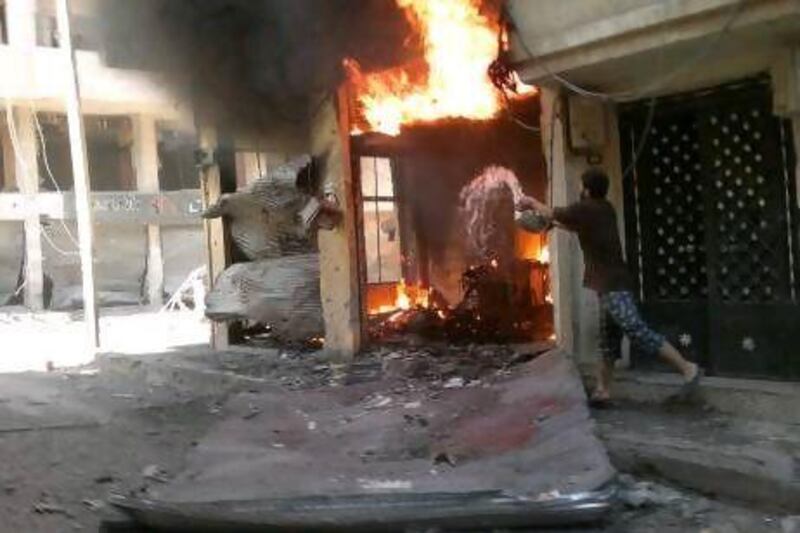ISTANBUL // The agreement by world powers on a transitional government for Syria is unlikely to stop the fighting because the plan lacks clarity and because both sides are looking for a decision on the battlefield, analysts say.
At a conference in Geneva, requested by Kofi Annan, the joint special envoy of the United Nations and the Arab League for Syria, western powers as well as Russia and China called for a transitional government in Syria after 16 months of violence that has left nearly 20,000 people dead, according to the opposition. But the meeting on Saturday did not spell out whether Bashar Al Assad, the Syrian president, or members of his government could be part of the proposed transitional leadership of the country.
"It is hard to see anything concrete coming out of this," Veysel Ayhan, the chairman of the International Middle East Peace Research Centre (IMPR), a think tank in Ankara, said yesterday. "The problem is that both sides are not looking for an agreement at the moment, but want to continue fighting. Clashes will increase."
Seda Altug, a Syria specialist at Istanbul's Bosphorus University, also said a lack of details in the agreement about a transition meant that the conflict was unlikely to be resolved soon.
"It was quite vague, nothing concrete, no road map, it's like escaping into the forest," Ms Altug said about the Geneva agreement yesterday. She said while the Al Assad regime was unwilling to negotiate with the opposition and ready to talk only with groups "they have appointed themselves", the armed rebels were still trying to convince the Syrian government and the outside world that they mattered militarily.
"They want to prove they are a force to be reckoned with," she said about rebels fighting against government troops. The fact that international powers were shunning radical steps for Syria "leads to a prolongation of the armed conflict".
Ahmet Davutoglu, the Turkish foreign minister, called the Geneva agreement a "first step", and a Turkish government source said it was positive that Russia had committed itself to a political transition in Syria.
But Mr Davutoglu added the Syrian regime was turning into a threat for the stability of the whole region, according to news reports. "Determined steps are needed to counter this. Determined decisions have to be reflected on the ground. We will be watching."
William Hague, the British foreign minister, also underlined that the Geneva agreement alone would not be enough. "Only a start, need to follow up & implement," he wrote on Twitter.
In a sign of heightened tensions on Syria's borders, Turkey's military said yesterday fighter jets had scrambled after Syrian helicopters approached the border area in three separate incidents on Saturday.
It was the first time the Turkish armed forces implemented a new policy by Ankara that says every movement by Syrian military units close to the border would be seen as a threat, following the downing of a Turkish military surveillance aircraft by Syria on June 23.
Neither side in the Syrian conflict signalled a willingness to heed Mr Annan's appeal "to come to a political agreement" along the lines drawn by international powers in Geneva. The conference chaired by Mr Annan called for a transitional government that could include members of the current Syrian government, the opposition and other groups. That government would oversee the drafting of a new constitution, as well as elections.
Mr Al Assad rejected all efforts by the international community to design a political solution, telling Iranian television he would not accept a "non-national model".
Mahmut Osman, Turkey representative of the Syrian National Council, an opposition umbrella group, said it was unthinkable for him to form a new government with representatives of the Al Assad administration.
"With 20,000 people killed and 30,000 people missing, you cannot sit at a table with the regime. Why should the Syrian people bear sacrifices like this only to sit at a table with them in the end?"
Mr Ayhan of the IMPR think tank said the West had made concessions to the Russian position at the Geneva talks by not insisting on Mr Al Assad's resignation as a precondition for any solution. "Assad has gained time," Mr Ayhan said. "Many points were left open in Geneva."
He added the Turkish government was right to be sceptical about the outcome of the conference. "How will all this be implemented?"
Ms Altug said the Geneva agreement had papered over deep differences between world powers. Referring to demands by western powers that Mr Al Assad should resign and Russia's refusal to accept a resignation of the regime as a precondition, Ms Altug said that basic rift resulted in the Geneva agreement expressing only "the lowest common denominator".





